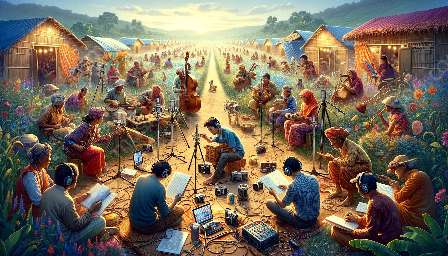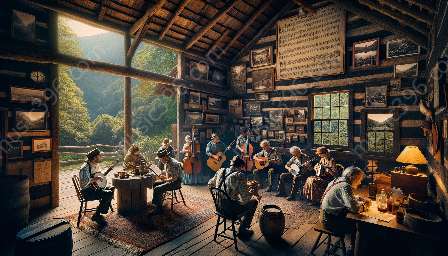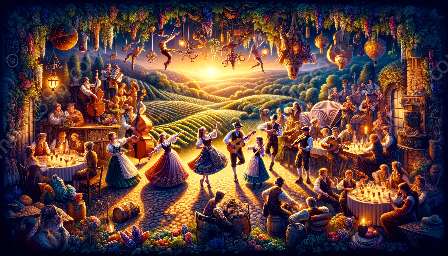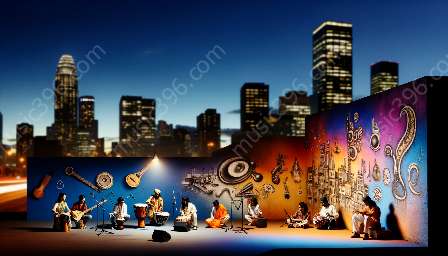Urbanization and industrialization have significantly influenced European folk music traditions, shaping the evolution and adaptation of traditional music through the lens of ethnomusicology. This topic cluster explores how socio-economic changes have impacted the music of various European regions, highlighting the resilience and transformations of folk music in response to urbanization and industrialization.
1. Evolution of European Folk Music
European folk music has a rich and diverse history, deeply rooted in the cultural and social fabric of different regions. Traditionally, folk music has been closely tied to rural communities, serving as a means of storytelling, celebration, and communication.
With the onset of urbanization and industrialization, the dynamics of European societies underwent significant shifts. The migration of people from rural areas to urban centers and the rapid industrial growth brought about profound changes in the socio-economic landscape.
This transformation also had a direct impact on the traditional folk music of Europe, prompting a process of evolution and adaptation as communities adjusted to the new urban and industrial environment.
2. Influence of Industrialization on Folk Music
As industrialization gained momentum across Europe, traditional ways of life and community structures underwent substantial changes. The shift from agrarian economies to industrialized urban centers led to a reconfiguration of social dynamics and cultural practices.
For European folk music, this period marked a time of both preservation and transformation. While some aspects of traditional music were preserved within rural enclaves, urban centers became melting pots of diverse musical influences, leading to the fusion of folk music with new urban sounds and genres.
Industrialization also facilitated the widespread production and distribution of music, enabling folk music to reach broader audiences and contribute to the emergence of early popular music forms that incorporated traditional elements.
3. Urbanization and Folk Music Practices
Urbanization brought about a new context for the practice and performance of European folk music. Urban centers became cosmopolitan hubs where diverse cultural traditions intersected, fostering the exchange and hybridization of musical styles.
The accessibility of new technologies, such as recording and broadcasting, played a crucial role in the dissemination of folk music, allowing for the preservation and documentation of traditional repertoire while also facilitating its adaptation to contemporary urban sensibilities.
Furthermore, urbanization created opportunities for folk musicians to connect with audiences beyond their immediate communities, leading to the formation of folk clubs, music festivals, and other public platforms that promoted the visibility and appreciation of European folk music.
4. Ethnomusicological Perspectives on Urbanization and Industrialization
The discipline of ethnomusicology provides valuable insights into the impact of urbanization and industrialization on European folk music. Ethnomusicologists study the intersection of music, culture, and society, analyzing how musical traditions adapt and transform in response to changing socio-economic conditions.
By employing ethnographic research methods, ethnomusicologists document the lived experiences of folk musicians and communities, shedding light on the ways in which urbanization and industrialization have shaped the performance practices, repertoire, and meaning of European folk music.
Through a comparative approach, ethnomusicologists examine the diversity of folk music traditions across European regions, tracing the continuities and innovations that have emerged as a result of urbanization and industrialization.
5. Contemporary Resilience and Revival of European Folk Music
Despite the far-reaching changes brought about by urbanization and industrialization, European folk music continues to exhibit resilience and adaptive creativity. In contemporary contexts, there has been a renewed interest in traditional folk music, leading to revival movements and the incorporation of folk elements into popular and experimental music genres.
Artists and scholars have engaged in efforts to safeguard and revitalize endangered folk music traditions, recognizing the cultural significance and historical narratives embedded within these musical expressions.
The dynamic interplay between tradition and innovation in European folk music reflects the ongoing negotiation of identity, community, and heritage in the face of urbanization and industrialization.
6. Conclusion
The evolution of European folk music in response to urbanization and industrialization underscores the intricate relationships between culture, society, and musical expression. Through the lens of ethnomusicology, we gain a deeper understanding of how folk music traditions have adapted to the changing landscapes of Europe, showcasing both continuity and transformation.
As we navigate the complex legacies of urbanization and industrialization, the preservation and celebration of European folk music traditions serve as an enduring reminder of the resilience and creativity embedded within cultural expressions.



































